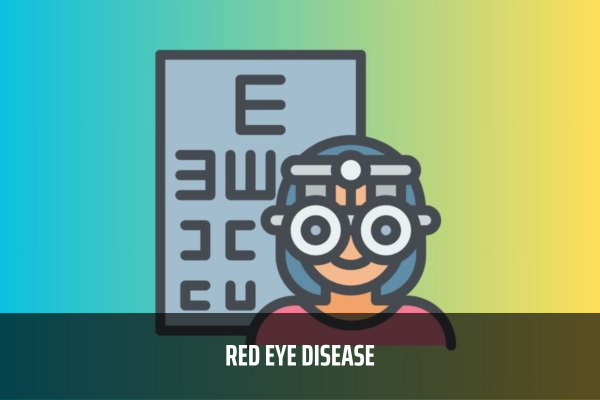Ministry of Health of Vietnam: What are signs and symptoms for identifying red eye disease? What are preventive measures for red eye disease?
Vietnam: What is red eye disease? What are the causes of red eye disease?
Pursuant to Section 1, Chapter 8 of the Guidelines for Diagnosis and Treatment of Eye Diseases issued with Decision 40/QD-BYT in 2015 by the Ministry of Health of Vietnam, which provides guidance on acute conjunctivitis:
GENERAL INFORMATION
- Acute conjunctivitis is the acute inflammation of the conjunctiva, usually caused by infection (viral, bacterial) or allergies.
Acute conjunctivitis can manifest in various forms:
- Acute purulent conjunctivitis caused by bacteria: This is a severe form of conjunctivitis with purulent discharge.
- Acute membranous conjunctivitis caused by bacteria: This is a form of acute conjunctivitis with a membrane covering the conjunctiva, which appears gray or whitish.
- Viral conjunctivitis: This is conjunctivitis accompanied by discharge, multiple secretions, and/or pseudomembranes. The disease is often accompanied by mild fever and flu-like symptoms, with preauricular lymphadenopathy, and it often progresses to exudation.
Pursuant to Section 1, Chapter 8 of the Guidelines for Diagnosis and Treatment of Eye Diseases issued with Decision 40/QD-BYT in 2015 by the Ministry of Health of Vietnam, the causes of acute conjunctivitis are as follows:
CAUSES
- Acute purulent conjunctivitis caused by bacteria: commonly caused by gonococcus (Neisseria gonorrhoeae), rarely caused by meningococcus (Neisseria meningitidis).
- Acute membranous conjunctivitis caused by bacteria: commonly caused by diphtheria bacteria (C. diphtheriae), streptococcus pyogenes, pneumococcus, etc.
- Viral conjunctivitis: caused by adenovirus, enterovirus, etc.
Therefore, in medical terms, red eye disease is referred to as acute conjunctivitis, which is the acute inflammation of the conjunctiva.
- Red eye disease can present in the following forms:
+ Acute purulent conjunctivitis caused by bacteria: This is a severe form of conjunctivitis with purulent discharge.
+ Acute membranous conjunctivitis caused by bacteria: This is a form of acute conjunctivitis with a membrane covering the conjunctiva, which appears gray or whitish.
+ Viral conjunctivitis: This is conjunctivitis accompanied by discharge, multiple secretions, and/or pseudomembranes. The disease is often accompanied by mild fever and flu-like symptoms, with preauricular lymphadenopathy, and it often progresses to exudation.
- The causes of red eye disease are usually infection (viral, bacterial) or allergies, specifically as follows:
+ Acute purulent conjunctivitis caused by bacteria: commonly caused by gonococcus (Neisseria gonorrhoeae), rarely caused by meningococcus (Neisseria meningitidis).
+ Acute membranous conjunctivitis caused by bacteria: commonly caused by diphtheria bacteria (C. diphtheriae), streptococcus pyogenes, pneumococcus, etc.
+ Viral conjunctivitis: caused by adenovirus, enterovirus, etc.

Ministry of Health of Vietnam: What are signs and symptoms for identifying red eye disease? What are preventive measures for red eye disease?
Ministry of Health of Vietnam: What are signs and symptoms for identifying red eye disease?
Pursuant to Section 3, Chapter 8 of the Guidelines for Diagnosis and Treatment of Eye Diseases issued with Decision 40/QD-BYT in 2015 by the Ministry of Health of Vietnam, the following are the signs and symptoms for identifying red eye disease:
In the eye:
- The disease initially appears in one eye and then spreads to both eyes.
- The incubation period ranges from a few hours to several days, with the highest discharge occurring on the fifth day.
- The disease progresses very rapidly:
- Swelling of the eyelids.
+ Conjunctival congestion and severe swelling.
+ Abundant dirty discharge, which forms rapidly after cleaning.
+ There may be hemorrhage or pseudomembranes.
+ If not treated promptly, the macula can become extensively infected, leading to macular pressure and potential necrosis or perforation.
General symptoms: There may be preauricular lymphadenopathy and mild fever.
Vietnam: What are the treatment for red eye disease?
Pursuant to Section 4, Chapter 8 of the Guidelines for Diagnosis and Treatment of Eye Diseases issued with Decision 40/QD-BYT in 2015 by the Ministry of Health of Vietnam, the following is the treatment for red eye disease:
In the eye:
- Remove the membrane daily.
- Continuously rinse the eye with 0.9% physiological saline solution to remove discharge and secretions.
- In the early days of the disease, which progresses rapidly, administer eye drops multiple times a day (15-30 minutes per time) from one of the following groups:
+ Aminoglycosides: tobramycin...
+ Fluoroquinolones: ofloxacin, ciprofloxacin, levofloxacin, moxifloxacin, gatifloxacin...
+ Use corticosteroids with caution: prednisolone acetate, fluorometholone.
- When the symptoms improve, reduce the frequency of eye drops.
- Use ointment from one of the above groups in the afternoon and evening.
- Provide nutritional support for the cornea and artificial tears.
Systemic treatment:
- Only use in cases of conjunctivitis caused by gonococcus or diphtheria.
- Antibiotics can be used after the disease has progressed severely and there are systemic symptoms.
+ Fluoroquinolones: contraindicated for children under 16 years old.
+ Medications to improve general condition.
+ Third-generation cephalosporins:
- For adults:
▪ If the cornea is not ulcerated: Single dose of 1 gram intramuscular injection.
▪ If the cornea is ulcerated: 1 gram three times a day intravenous injection.
For children: Single dose of 125mg intramuscular injection or 25mg/kg body weight two to three times a day for seven days intramuscular injection.
Ministry of Health of Vietnam: What are preventive measures for red eye disease?
Pursuant to Section 6, Chapter 8 of the Guidelines for Diagnosis and Treatment of Eye Diseases issued with Decision 40/QD-BYT in 2015, the following are the preventive measures for red eye disease:
- Treat sexually transmitted infections (if present).
- Practice hygiene and administer antibacterial/antibiotic drugs to newborns immediately after delivery.
- Ensure that children receive complete immunizations according to regulations.
- Always maintain good overall health.
- If infected, actively seek treatment to prevent the spread of the disease.
LawNet
